|
|
|
Sort Order |
|
|
|
Items / Page
|
|
|
|
|
|
|
| Srl | Item |
| 1 |
ID:
079237
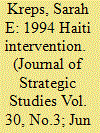

|
|
|
|
|
| Publication |
2007.
|
| Summary/Abstract |
Observers of United States (US) interventions have almost universally characterized the 1994 Haiti intervention as multilateral, a model for how international cooperation can achieve common security goals. A closer analysis of the intervention reveals that the planning and execution of the intervention were almost entirely unilateral and therefore cost the US few if any of the theoretical costs of coalition warfare, including interoperability and policy compromise. Mapped onto the unilateral strategy and operation of the intervention, however, was a multilateral diplomatic effort that secured United Nations Security Council authorization and provided a cover for an intervention that the US had already planned and intended to execute with or without that authorization. That the US sought a multilateral cover for an intervention that it could easily accomplish unilaterally shows the importance of two factors: A domestic audience that opposed unilateral peacekeeping but would accept using US resources as part of a broader multilateral operation, and a local population that would be more responsive to a multilateral coalition than a use of force that was perceived to be unilateral. The Haiti intervention shows that the determinants of success in operations other than war are as much political as military. When the US already has overwhelming military superiority vis-à-vis its adversary, building military coalitions becomes as much about enlisting political support as aggregating material capability.
|
|
|
|
|
|
|
|
|
|
|
|
|
|
|
|
| 2 |
ID:
092909
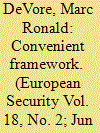

|
|
|
|
|
| Publication |
2009.
|
| Summary/Abstract |
One important discussion about European security focuses on what types of institutions will enable Europe to effectively intervene in regional crises. Thus far, the consensus has been that a European Security and Defense Policy should possess, for its military component, a highly institutionalized and integrative inter-governmental structure. Ironically, Europe's greatest collective foreign military successes were obtained under the organizational auspices of the Western European Union (WEU), whose ill-defined mandate and weak institutional structures contrast markedly from current policy prescriptions. In two campaigns, the WEU coordinated efforts to protect maritime commerce and swept sea lanes for naval mines during the Iran-Iraq War (1987-1988), enforced the United Nations embargo of Iraq during the 1990-1991 Gulf Crisis, and cleared the naval mines left behind after the 1991 Gulf War. The lesson to be drawn from these successful interventions is that Europe profited from a structure capable of limiting the political and diplomatic costs of intervening abroad and not, as is often assumed, an organization designed to maximize military efficiency.
|
|
|
|
|
|
|
|
|
|
|
|
|
|
|
|
| 3 |
ID:
164029
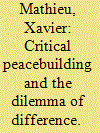

|
|
|
|
|
| Summary/Abstract |
Recent research has revealed the need to include and understand local actors in order to improve the effectiveness of peacebuilding. According to these analyses, peacebuilding could become more respectful of cultural differences thanks to a genuine engagement with the specificities of the local. Empirical studies of the ‘different’ local have thus flourished in the field with the ambition of countering the universalist tendency of traditional peacebuilding. Through the use of the concept of ‘dilemma of difference’, this article challenges this intuitive argument and argues that these approaches risk reproducing a stigma attached to the ‘different’ local. Indeed, emphasising difference in order to ensure its respect means separating and reifying ‘it’ as a deviation from the norm(al). As such, this analytical strategy is likely to recreate the stigma that contributed to the exclusion of local actors in previous peacebuilding practice and research. In contrast, I outline three strategies for studying difference differently in peacebuilding: focusing on the institutional arrangements that enabled specific differences to emerge and become visible; recognising that these differences are internal to peacebuilding (and thus an unlikely source of alternative and emancipation); and revealing the unstated and implicit Self for/from whom local difference is relevant.
|
|
|
|
|
|
|
|
|
|
|
|
|
|
|
|
| 4 |
ID:
073764
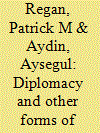

|
|
|
|
|
| Publication |
2006.
|
| Summary/Abstract |
Much of the empirical literature suggests that outside interventions tend to lengthen the expected duration of civil wars; conversely, the policy community often acts as if it holds the opposite expectation for the outcome of intervention. The authors argue that the divergence can be found in how models of intervention are specified in the literature. They propose a model with two novel contributions. First, they incorporate mediations as the key to resolving the strategic problems that the civil war parties face. Second, they account for the decaying effect of interventions over time. Their results suggest that diplomacy is critical for understanding the duration of civil conflicts. They find that mediation has a dramatic effect on the expected duration of a civil war and that when controlling for diplomatic efforts, economic interventions can also reduce the expected duration.
|
|
|
|
|
|
|
|
|
|
|
|
|
|
|
|
| 5 |
ID:
111370


|
|
|
|
|
| Publication |
2012.
|
| Summary/Abstract |
This paper discusses domestic energy use and energy behaviour. It shows some improvement in domestic energy consumption and adoption of good energy practice. The survey conducted indicated that 35% of homes could improve their energy efficiency by improved tank insulation. In the last 5 years condensing boilers have been installed only in 3% of homes, indicating that householders are unaware of their advantages. Although 88% of surveyed homes had purchased a major appliance in the last 2 years, only 16% had any idea of the energy rating of their new appliances. Use of energy saving light bulbs is predominant in kitchens compared to other rooms. 70-80% of householders undertook some kind of day-to-day energy efficiency measures. 20-35% of householders would like to invest in energy-saving measures but found cost to be a key barrier. Approximately 84% of those surveyed were unaware of the energy rating of their household appliances. Price and brand were the most important factors determining the purchase of a new appliance. Significant energy-saving could be achieved by providing appropriate information to the general public regarding temperature control, efficiency of appliances and energy-saving heating systems.
|
|
|
|
|
|
|
|
|
|
|
|
|
|
|
|
| 6 |
ID:
146926
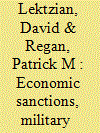

|
|
|
|
|
| Summary/Abstract |
Sanctions are designed to reduce the amount of resources available to the targeted actor and have the potential to be an effective tool for bringing disputing sides in a civil conflict to the bargaining table by altering incentives for continued fighting. Thus, there is reason to believe that sanctions can shorten the duration of civil conflicts. However, once sides in a conflict have moved to the use of violence to settle their dispute, it is hard for sanctions, in isolation, to impose enough cost to convince warring factions that settling a conflict has greater value than what could be expected from continued fighting. In this article, we argue that sanctions, in isolation, are unlikely to affect the duration of civil conflicts. However, when sanctions are combined with military interventions they can contribute to conflict management strategies resulting in shorter civil conflicts. We test our expectations empirically using data on civil conflicts from the Uppsala Conflict Data Program Armed Conflict Database and data on economic sanctions from the Threat and Imposition of Economic Sanctions Database. Our results suggest that the best hope for sanctions to shorten the duration of civil conflicts is if they are used as part of a comprehensive international response that includes institutional sanctions and military interventions.
|
|
|
|
|
|
|
|
|
|
|
|
|
|
|
|
| 7 |
ID:
191034


|
|
|
|
|
| Summary/Abstract |
There currently exists little evidence on the effectiveness of case-managed programs targeting radicalised individuals. This paper provides results from an evaluation of two case-managed interventions implemented by police in Australia, referred to as Intervention 1 and Intervention 2. Drawing on client case note data and interviews, the paper provides quantitative and qualitative results. It examines client change using a five-point metric and details two individual case studies. Results provide data on radicalised behaviours, intervention goals and services offered to clients. Individual client progress is explored, and the overall effectiveness of both programs examined. The results show a positive relationship between client change and different measures of engagement. Limitations of the evaluation methodology and data sources are acknowledged and addressed. Lessons are highlighted relating to the assessment of client change, program evaluation and the role of interventions in supporting disengagement.
|
|
|
|
|
|
|
|
|
|
|
|
|
|
|
|
| 8 |
ID:
158663
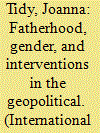

|
|
|
|
|
| Summary/Abstract |
War and peace are gendered and gendering geopolitical processes, constituting particular configurations of masculinity and femininity. When men are considered in relation to war and peace the majority of scholarly accounts focus on soldiers and perpetrators, typically observing their place in the gendered geopolitical solely through military/ized masculinities. In contrast, this article examines fatherhood as a masculine subjectivity, interacting in a nexus with other masculinities to produce an intelligible propeace intervention in war, and considers the implications for our understandings of gender and the geopolitical. To analyze this political subjectivity of what I term “paternal peace,” the article considers the case of Bob Bergdahl. Bergdahl’s son was a US soldier held by a Taliban-aligned group for five years until 2014. During this time Bergdahl was publically critical of US foreign policy, presenting his son’s release as part of a peace process that could end violence in Afghanistan. I unpack how Bergdahl’s public political subjectivity was the outcome of a “gender project” drawing on accounts of “valley” fatherhood in combination with particular forms of diplomatic and military masculinity. I consider how Bergdahl’s intervention was publically received, and how the geopolitical reach of it was pacified within gendered and racialized coding.
|
|
|
|
|
|
|
|
|
|
|
|
|
|
|
|
| 9 |
ID:
155691


|
|
|
|
|
| Summary/Abstract |
One of the core principles of EU interventions under the Common Security and Defence Policy (CSDP) has been local ownership. While the EU takes pride in fully respecting this principle, the existing research suggests that the implementation has been far from smooth. However, we still know very little how this principle is conceptualised and operationalised, let alone why its implementation has been so difficult. Drawing on document analysis and 27 in-depth interviews, the article makes 3 arguments. First, ownership is increasingly construed in the EU policy rhetoric as a middle ground between imposition and restraint. Second, in practice, ownership is operationalised as an externally driven, top-down endeavour, resulting in the low degree of local participation. Third, in addition to the obstacles normally faced by other peace-builders, the EU’s efforts to implement ownership are constrained by the politics and policy-making of CSDP. The arguments are illustrated in a case study of the European Union Mission on Regional Maritime Capacity Building in the Horn of Africa (EUCAP Nestor).
|
|
|
|
|
|
|
|
|
|
|
|
|
|
|
|
| 10 |
ID:
193202


|
|
|
|
|
| Summary/Abstract |
The paper interrogates the paradox of persistent youth unemployment amid an upswing of impressive economic growth after Neo-liberal reforms in Uganda. The government of Uganda undertook targeted interventions to ameliorate youth unemployment, which escalated. Why was the growing economy failing to absorb labour? Why were the interventions failing? We argue that the interplay of the skewed neo-liberal and global architecture, decline of traditional labour absorbing sectors, and the debilitating syncretic ‘informal’ sector constrained sustainable youth employment and deflated interventions. The paper opines that Uganda’s neo-liberal capitalism was unique, as it was structured in a way that did not enhance domestic actors and sectors, which would have increased sustainable labour absorption and utilisation. Otherwise, Uganda’s celebratory growth was largely aid-driven and in the controversial and constrained informal sector, limited service ‘enterprises’ and import consumerism, which undermined domestic productivity and employability. Neo-liberalism and the reconstituted state did not align the domestic and global economic structures for meaningful employment. Unemployment spiralled into the socio-political landscape, while youth agency strived for better positioning.
|
|
|
|
|
|
|
|
|
|
|
|
|
|
|
|
| 11 |
ID:
184201
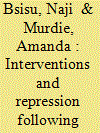

|
|
|
|
|
| Summary/Abstract |
Civil conflicts inevitably have negative consequences with regards to respect for human rights within affected states. Unfortunately, the violation of human rights often does not end with the conflict. What factors explain variation in state repression in post-civil conflict societies? Can international interventions, both civilian and military, improve human rights in states with a history of conflict? Does the size of the intervention matter? We argue that international interventions, including peacekeeping missions and officially directed foreign aid, can reduce physical integrity abuses. This process occurs by simultaneously increasing protections for civilians while also raising the costs of repression to both government leaders and their agents. Human rights abuses will also decrease when there are legal remedies available to vulnerable populations which are bolstered by a strong judicial system. A robust civil society can also discourage human rights abuses by shedding light on these events and providing human rights education. In line with our theoretical argument, we focus on UN peacekeeping missions, especially those with human rights teams, and officially directed foreign aid for legal and security sector reform and NGOs. Using both a treatment effects approach and a continuous dose–response model, we find much support for the implications of our argument.
|
|
|
|
|
|
|
|
|
|
|
|
|
|
|
|
| 12 |
ID:
157978
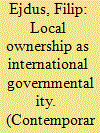

|
|
|
|
|
| Summary/Abstract |
While some Foucault-inspired studies construe local ownership in international interventions as a form of liberal governmentality that aims to govern through freedom, others lambast it as an illiberal governmentality that is likely to be resisted because it undermines local autonomy. However, we still do not know what is the rationality behind local ownership, how it is being operationalized, and why a principle that aims to govern through freedom ends up curtailing it. I argue that local ownership, echoing the colonial principle of indirect rule, is driven by the rationality of advanced democracies on how best to govern global insecurities at a distance. Consequently, ownership is operationalized as responsibilization for externally designed objectives. This often gives rise to local resistance which undermines international efforts to achieve ownership. I illustrate my arguments with evidence from the EU Mission on Regional Maritime Capacity Building in the Horn of Africa (EUCAP Nestor).
|
|
|
|
|
|
|
|
|
|
|
|
|
|
|
|
| 13 |
ID:
171507
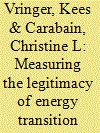

|
|
|
|
|
| Summary/Abstract |
In line with the Paris Agreement, the Dutch Government aims to achieve 49% CO2 emission reduction by 2030. The required energy transition will have a large impact on Dutch society. So, it is important that citizens and companies support and agree on the required policies. This paper explores the legitimacy of these policies and how to measure the degree of such legitimacy.
A survey among Dutch citizens and company representatives shows support for the emission reduction policy goals (input-legitimacy). We also explored support for two specific policy interventions (output legitimacy): 1) an ‘in-home display’, collectively paid for by all energy consumers, and 2) an in-home display that is paid for by the energy companies. Both interventions are supported by around 50% of the citizens and companies. We found strong correlations between underlying aspects of legitimacy (related to good governance criteria) and the overall support for the interventions. We also found that public support for a policy goal does not automatically result in support for the associated intervention. This emphasizes the importance of ex-ante testing of specific interventions to determine the level of public support, so that policy can become more effective and efficient.
|
|
|
|
|
|
|
|
|
|
|
|
|
|
|
|
| 14 |
ID:
021596
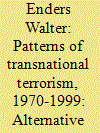

|
|
|
|
|
| Publication |
June 2002.
|
| Description |
145-165
|
|
|
|
|
|
|
|
|
|
|
|
|
|
|
|
| 15 |
ID:
100323


|
|
|
|
|
| Publication |
2010.
|
| Summary/Abstract |
This article examines an emerging approach, called 'reconstruction from below', and its growing body of practice. The article argues that interventions for post-war reconstruction increasingly espouse a commitment to be bottom-up and contextually relevant, to look beyond state institutions, and to provide space for local ownership. The article traces the emergence of this approach to six factors present in international policy. It then examines the growing body of practice in the domains of livelihoods, institution building and basic service provision. It concludes that this approach is not the magic bullet that agencies seem to expect. Reconstruction from below rests on many untested assumptions. Programmes formed pursuant to these notions are often poorly adapted to the challenges encountered and hampered by mistrust of the local institutions to which this approach rhetorically entrusts reconstruction. The large and growing body of evolving experience suggests that it is time to take stock and learn lessons about how reconstruction from below functions in practice.
|
|
|
|
|
|
|
|
|
|
|
|
|
|
|
|
| 16 |
ID:
021069
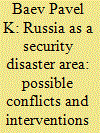

|
|
|
|
|
| Publication |
Spring 2002.
|
| Description |
217-245
|
|
|
|
|
|
|
|
|
|
|
|
|
|
|
|
| 17 |
ID:
149623
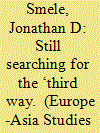

|
|
|
|
|
| Summary/Abstract |
This essay offers a critical analysis of the contributions to the history of the Russian Civil Wars made by one of its most prolific and controversial historians, Geoffrey Swain, setting his monographs, articles, chapters, book reviews and other writings on the subject into broader developments in the field. The author finds that Swain’s interventions in debates on the civil wars have cut against the grain in many respects, but that Swain’s case for the potentiality of an alternative outcome to the Civil-War struggles—a ‘Third Way’, one that was neither Red nor White but ‘Green’—remains, so far, not proven.
|
|
|
|
|
|
|
|
|
|
|
|
|
|
|
|
| 18 |
ID:
139227
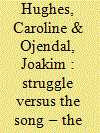

|
|
|
|
|
| Summary/Abstract |
This introduction presents how views on ‘the local turn’ in peacebuilding has evolved into a significant discourse. Currently, it has ‘its moment’ and is widely used by theorists and practitioners alike, by normative localists as well as by liberal policy-makers, albeit for different reasons and with differing intensions. We suggest that international interventions for the purpose of peacebuilding cannot be justified a priori, but requires resonance at the ‘receiving end’, which the local dimension potentially offers. It is however an elusive and contested concept that requires thorough scrutiny and critical assessment. Here a collection of conceptual and empirical articles is contextualised and introduced, painting a broad state-of-the-art of the pros and cons of the local turn.
|
|
|
|
|
|
|
|
|
|
|
|
|
|
|
|
| 19 |
ID:
021420
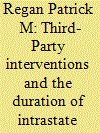

|
|
|
|
|
| Publication |
Feb 2002.
|
| Description |
55-73
|
|
|
|
|
|
|
|
|
|
|
|
|
|
|
|
| 20 |
ID:
155775
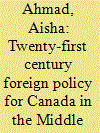

|
|
|
|
|
| Summary/Abstract |
The security crises facing the Middle East and North Africa are among the most complex and volatile in the world today. These protracted conflicts are shaped by a range of catalysts, including state failure, environmental stress, entrenched criminal war economies, ethnic and tribal hostilities, and ideological extremism. Not only are these highly fragmented conflicts, but the multiple actors in each of these theatres also have transnational linkages that trigger contagion effects across state borders. To understand these new twenty-first century security crises, scholars and policy practitioners alike require modern analytical tools. Gone are the days when Canadian foreign policy experts could rely on classic state-based models to explain and predict global violence. To address these contemporary challenges, Canada must adopt a forward-looking approach to the Middle East and North Africa, which does not shy away from the compound and multidimensional challenges that these complex environments present.
|
|
|
|
|
|
|
|
|
|
|
|
|
|
|
|
|
|
|
|
|